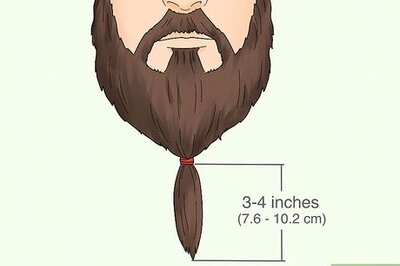
views
Investigating Your Own Background

Check your own background. It can be important to check your own background for two main reasons. The first reason is to search for any incorrect information that can erroneously make you look unappealing to your employer. The second reason is to discover any old records or information that may have been removed from your record, freeing you from mentioning it. Try searching for your personal information in the following ways: Search for yourself on-line. If you find any questionable things you may have posted on social media, consider deleting or removing them. Check any court or criminal records to make sure the information contained in them is correct. Make sure your employment history is correct and accurate. There are services on-line that you can pay a fee and receive your own background check.

Examine your credit report. Before you apply or go into your interview, you will want to check your credit score and credit report. This will allow you to learn what your employer might find during their own investigation and prepare for this. Search for your credit score using one of the three main credit reporting agencies Experian, Equifax and TransUnion. Dispute any errors that might be tarnishing your credit score. You will have to sign a release that allows your employer to check your credit report. Don't lie about anything accurate that shows up on your credit report.

Understand that not everything will appear on your background check. Not everything involved in your past will show up on your background check. You also won't need to concern yourself with mentioning these issues to your employer as they won't be included in your background check. Review the following items to learn what won't show up during a background check. Any bankruptcies older than 10 years. Civil suits, judgments and records of arrest older than 7 years. Any tax liens that have been paid and are older than 7 years. Excluding criminal convictions, all other negative information older than 7 years will not show up.
Getting A Position With A Bad Background Check

Tell the truth and be honest. As you apply for a position or during an interview, you will always want to be totally honest with your new potential employer. If you have anything on your record that might be considered an issue, you should bring it up and explain that issue. Being honest and direct about past issues can overpower the issues themselves. Always be honest about past issues that might show up on your background check. Being direct and honest can demonstrate your character and cause your employer to overlook the issues on your background check. Try to convey that you have learned from any past issues and have moved on from them.

Be ready to explain any issues regarding your background. If you suspect that there will be an issue with your background check, you should be ready to discuss this issue with your potential employer or interviewer. Ideally, you should bring this issue up as soon as you can, either during your first phone or in person interview to demonstrate a willingness to be honest and direct. Having a single, minor offense might be overlooked entirely. Multiple offenses of a similar type will likely not be ignored. The nature of your offense may be directly relevant to your position. For instance, being convicted for embezzling will likely exclude you from future financial positions.

Dispute any incorrect information. If you are refused a position due to something that was present during a background check, your employer will have to disclose the specific reason you were denied the position. If you suspect this information to be wrong or incorrect, you are allowed time to dispute this claim and resubmit to the background check. Your employer must disclose any reasons they denied your application due to a background check. You have sixty days to challenge any erroneous information found during your background check. You are able to resubmit to the background check after you have successfully challenged incorrect information.

Seek out positions that are unlikely to do background checks. Not all companies or firms have the time or funding to do a detailed background check. By looking for the right company or firm you can apply for a position without much concern for your background check affecting the process. Smaller companies and firms are less likely to run detailed background checks. Some temp agencies won't have detailed background checks. If hired, you can still work towards a full time position and avoid a background check causing trouble.

Have strong references. Even if you have a bad background check, having impressive references can help you to still obtain the position you are applying for. A good reference can vouch for your character and argue why you are a good fit for the position despite any issues regarding your background check. Make sure your references are aware that you are listing them as such. Find references that you are sure will speak highly of you.


















Comments
0 comment